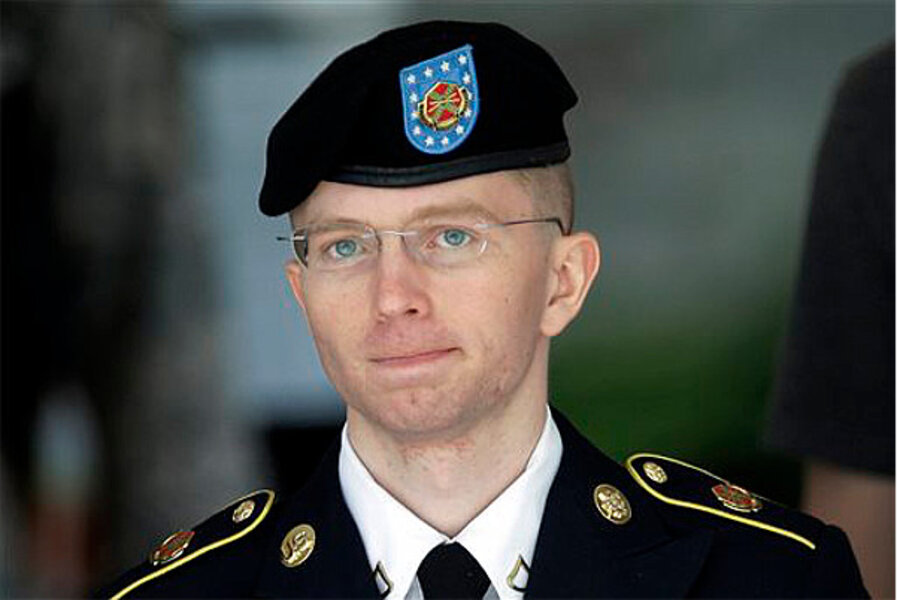WikiLeaks trial: Prosecution rests after calling 80 witnesses
Loading...
| FORT MEADE, Md.
Prosecutors rested their case against Pfc. Bradley Manning on Tuesday after presenting evidence from 80 witnesses, trying to prove the former U.S. Army intelligence analyst let military secrets fall into the hands of Al Qaeda and its former leader Osama bin Laden.
The 25-year-old native of Crescent, Okla., is charged with 21 offenses, including aiding the enemy, which carries a possible life sentence. To prove that charge, prosecutors must show Manning gave intelligence to the anti-secrecy website WikiLeaks, knowing it would be published online and seen by an enemy of the United States.
Manning has acknowledged sending more than 700,000 Iraq and Afghanistan war logs and State Department diplomatic cables, along with several battlefield video clips, to WikiLeaks while working in Baghdad from November 2009 through May 2010.
The defense could begin its case as early as Monday, when the trial will resume. Manning's defense said at the opening of the trial that he was a young and naive, but a good-intentioned soldier whose struggle to fit in as a gay man in the military made him feel he "needed to do something to make a difference in this world."
He told a military judge in February he leaked the war logs to document "the true costs of the wars in Iraq and Afghanistan," including the deaths of two Reuters employees killed in a U.S. helicopter attack. Manning said the diplomatic cables revealed secret pacts and deceit he thought should be exposed.
Prosecutors presented evidence that Manning, a former intelligence analyst, used military computers in Iraq to download reams of documents and battlefield video from a classified network, transferred some of the material to his personal computer, and sent it to WikiLeaks.
The evidence showed Manning's training repeatedly instructed him not to give classified information to unauthorized people.
As they wrapped up their case, prosecutors offered that Al Qaeda leaders reveled in WikiLeaks' publication of classified U.S. documents, urging members to study them before devising ways to attack the United States.
"By the grace of God the enemy's interests are today spread all over the place," Adam Gadahn, a spokesman for the terrorist group, said in a 2011 Al Qaeda propaganda video. The video specifically referred to material available on the WikiLeaks website.
The government also presented evidence that bin Laden asked for and received from an associate the Afghanistan battlefield reports WikiLeaks published. The evidence was a written statement, agreed to by the defense, that the material was found on digital media seized in the May 2011 raid on bin Laden's compound in Pakistan. Bin Laden was killed in the raid.
Prosecutors struggled to prove Manning collaborated with WikiLeaks founder Julian Assange or looked to the website for guidance — assertions meant to show that he leaked the material with evil intent.
Manning's intent is a key issue, said Philip Cave, a retired Navy lawyer in private practice in Alexandria, Va.
"I think it was pretty clear that WikiLeaks would have released anything and everything," he said. "Just because he did it that way, is that evidence of intent to share it with the enemy?"
Manning faces eight espionage counts and a computer fraud charge, all alleging he either exceeded his authorized access to classified information or had unauthorized possession of national defense material. His top-secret clearance enabled him to look at many kinds of classified information, but an information assurance officer, Capt. Thomas Cherepko, testified that "having the ability to go there doesn't mean you have the need or authority to go there."
Manning is also charged with five counts of theft, each alleging he stole something worth more than $1,000.
The trial is being heard by a judge, not a jury. It began June 3 and was in session for 14 days before the prosecution rested.
Prosecutors requested fewer courtroom closures to discuss classified information than they projected before the trial started. Maj. Ashden Fein initially said as much as 30 percent of the government's case would require closing the courtroom, but there were only three secret sessions.
"They may have felt that it was not serving public confidence in the administration of justice to run any more of it than was absolutely necessary behind closed doors," said Eugene Fidell, who teaches military justice at Yale Law School.
Manning has pleaded guilty to reduced charges on seven of eight espionage counts and two computer fraud counts. He also has pleaded guilty to violating a military regulation prohibiting wrongful storage of classified information. The offenses carry a combined maximum prison term of 20 years.
Despite his pleas, prosecutors are seeking to convict him of the original charges.







